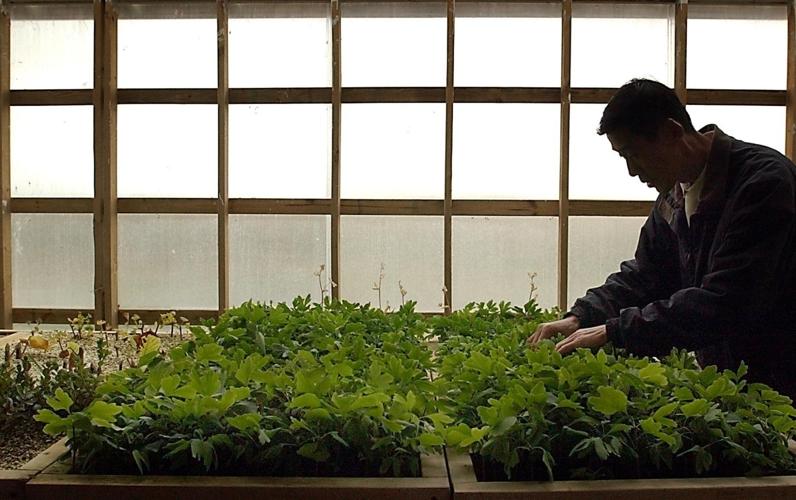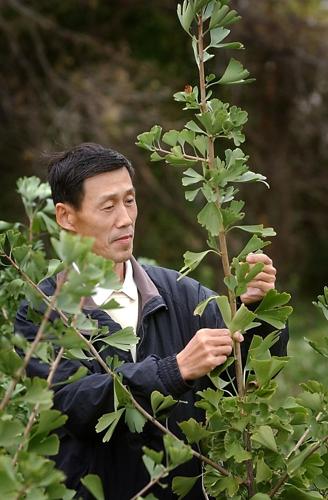A Chinese vegetable farmer in rural Madelia came up with the idea to supply ginkgo trees to every town in Minnesota.
Despite numerous obstacles, Kun Hung is still determined to see his dream come true.
“I plan to grow 100,000 ginkgo trees and supply each city in Minnesota,” said Hung. “It will take quite a few years to get it done.”
For Hung, ginkgo trees are not just a business, they are his gift to the environment and society. “If I am successful with this contribution, maybe my name will be mentioned — Mr. Hung and the ginkgo trees,” he suggested with a warm smile.
While his ginkgo trees are growing, Hung is raising a variety of Chinese vegetables on an eight-acre farm. Battling mosquitoes, heat and drought, Hung plants, transplants, weeds, picks and pulls his crops, putting in hard work and long hours in the gardens and driving his produce to his customers.
He came to the United States with $50 after getting his college degree in horticulture in China. After a short time in Texas he came to Minnesota with several friends. Together they opened Chinese restaurants in Albert Lea, Fairmont, Fort Dodge, Fairmont and Windom.
Although the restaurants were successful, Hung sold his part of the businesses in order to buy a small farm. “I’ve always been really interested in farming and horticulture,” said Hung “I wanted to grow things using my experience.”
Because he couldn’t compete with established nurseries in the area, he wondered what he should do.
“I did a lot of research and realized I’d have to do something totally different from the nurseries.”
At the same time Hung noticed Minnesota had very few ginkgo biloba trees.
“The tree has a very special place in China,” said Hung, where the leaves are used for both culinary and medicinal purposes. “The ginkgo seed is a delicious food,” said Hung. “In China, if you are rich enough, you would eat 10 such seeds a day.”
Hung said the trees are perfect for Minnesota. Growing 60 to 110 feet tall with fan-shaped leaves, these trees are not only attractive but also hardy and wind-resistant. They also have few diseases or insect problems, making them an excellent urban shade tree, according to Hung.
Interestingly, ginkgo trees have no close living relatives and they are actually living fossil trees. Despite all their positive attributes, ginkgo trees have one problem — the mature female tree has a terrible smell.
After settling on a plan to sell male ginkgo trees, Hung made arrangements to import 10,000 20-foot-high trees shipped in humidity controlled cargo boxes from China. But when they reached the Seattle port, USDA inspectors seized the entire shipment. An inspector informed Hung that, according to U.S. law, any ginkgo trees imported had to be shorter than 18 feet and less than two years old.
The USDA also charged Hung almost $5,000 to destroy his trees. Determined not to give up, Hung had a friend in China graft branches on established ginkgo tree roots that would meet the height and age requirements. This time 3,500 ginkgo trees made their way to Seattle.
"The inspector called me and said he found bacteria in the cargo boxes,” said Hung. For the second time, the trees were destroyed and Hung had lost not only his investment, but paid again to have to his trees destroyed.
Despite two failed attempts, Hung would not give up. He was still determined to carry out his plan. There were still 350 grafted tree roots in China that his friend had not included in the second shipment. “This time we imported them through New York and there was no problem,” said Hung.
Three years ago his ginkgo trees made their way to Madelia. Since then, however, Hung has changed his strategy and has started a few thousand ginkgo trees from seed. Hung now admits that his dream of supplying Minnesota with ginkgo trees will take several years. Until his trees are large enough to sell, Hung has to make a living not only for himself but his wife and infant daughter.
“I wanted to import something different,” Hung said. He started Exotic Flora, selling water lilies and lotus in Chinese pots to nurseries including Drummer’s in Mankato and Linder’s Garden Center in the Twin Cities.
He also grows a large selection of vegetables on his farm. Among his customers are the Asian community and Chinese restaurants, including the ones he once owned. There are rows and rows of egg plants, chives, celery, cucumbers, peppers, cabbage, melons, pumpkins, radishes, herbs and tomatoes. Most are Chinese varieties.
“I don’t want to just grow something, I want to grow something special,” said Hung, who uses organic methods. He not only guarantees the quality of his products, he sells his produce lower than market price.
Hung, who increases the size of his vegetable gardens every year, jokingly points out he still has a lawn in front of his house.
“I work harder every year,” he said, “but I want to do it my way.”
If all goes according to his plan, someday ginkgo trees will be commonplace in this area.
“I’m a one-man corporation,” said Hung, “doing business very quietly with no advertising.”

- John Cross
The Free Press, Mankato, MN

- John Cross
The Free Press, Mankato, MN

- John Cross
The Free Press, Mankato, MN

- John Cross
The Free Press, Mankato, MN
Chinese farmer brings ginkgo trees to state
- Mickey Tibbits
- Updated
Most Popular
Articles
- St. Peter fire victim identified
- Florist retires, leaves regulars in tears
- Contract dispute leads to cancellation of this year’s Mankato River Ramble
- Alleged drive-by shooter arrested Monday
- Pre-construction meeting set for Riverfront Drive
- Gustavus students reevaluate phone use
- First bison baby of spring born at Minneopa State Park
- Inmate who died at Waseca prison remembered by family members
- Hacker's grand slam leads East past West
- Blue Earth County monthly siren test failed Wednesday



























Commented
Sorry, there are no recent results for popular commented articles.